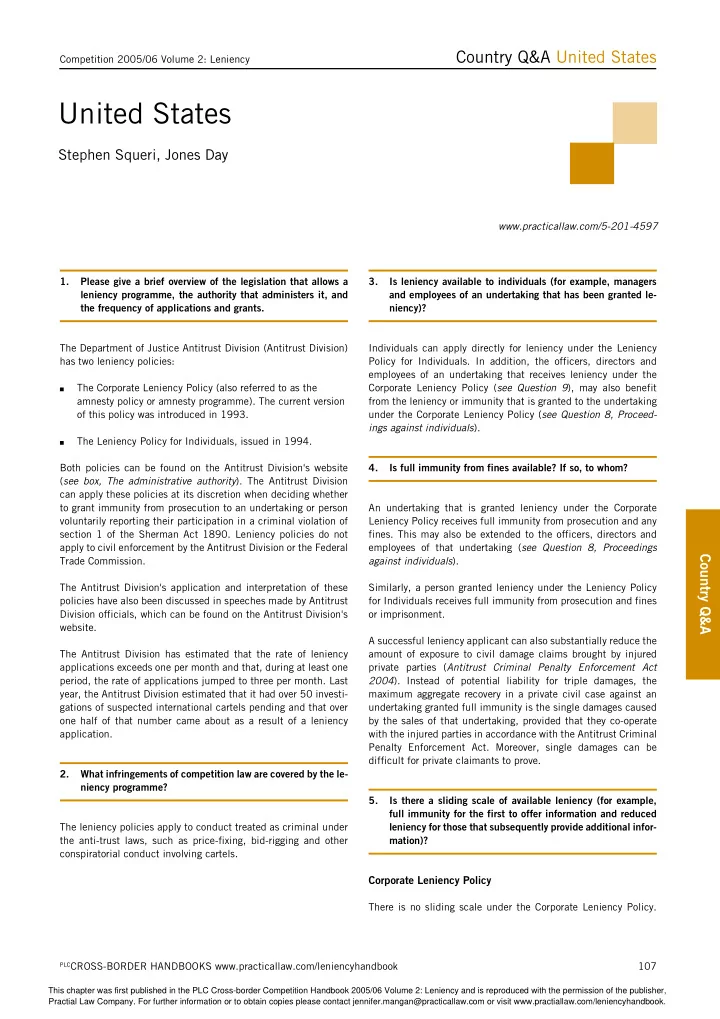

Country Q&A United States Competition 2005/06 Volume 2: Leniency United States Stephen Squeri, Jones Day www.practicallaw.com/5-201-4597 1. Please give a brief overview of the legislation that allows a 3. Is leniency available to individuals (for example, managers leniency programme, the authority that administers it, and and employees of an undertaking that has been granted le- the frequency of applications and grants. niency)? The Department of Justice Antitrust Division (Antitrust Division) Individuals can apply directly for leniency under the Leniency has two leniency policies: Policy for Individuals. In addition, the officers, directors and employees of an undertaking that receives leniency under the The Corporate Leniency Policy (also referred to as the Corporate Leniency Policy ( see Question 9 ), may also benefit ■ amnesty policy or amnesty programme). The current version from the leniency or immunity that is granted to the undertaking of this policy was introduced in 1993. under the Corporate Leniency Policy ( see Question 8, Proceed- ings against individuals ). The Leniency Policy for Individuals, issued in 1994. ■ Both policies can be found on the Antitrust Division's website 4. Is full immunity from fines available? If so, to whom? ( see box, The administrative authority ). The Antitrust Division can apply these policies at its discretion when deciding whether to grant immunity from prosecution to an undertaking or person An undertaking that is granted leniency under the Corporate voluntarily reporting their participation in a criminal violation of Leniency Policy receives full immunity from prosecution and any section 1 of the Sherman Act 1890. Leniency policies do not fines. This may also be extended to the officers, directors and apply to civil enforcement by the Antitrust Division or the Federal employees of that undertaking ( see Question 8, Proceedings Country Q&A Trade Commission. against individuals ). The Antitrust Division's application and interpretation of these Similarly, a person granted leniency under the Leniency Policy policies have also been discussed in speeches made by Antitrust for Individuals receives full immunity from prosecution and fines Division officials, which can be found on the Antitrust Division's or imprisonment. website. A successful leniency applicant can also substantially reduce the The Antitrust Division has estimated that the rate of leniency amount of exposure to civil damage claims brought by injured applications exceeds one per month and that, during at least one private parties ( Antitrust Criminal Penalty Enforcement Act period, the rate of applications jumped to three per month. Last 2004 ). Instead of potential liability for triple damages, the year, the Antitrust Division estimated that it had over 50 investi- maximum aggregate recovery in a private civil case against an gations of suspected international cartels pending and that over undertaking granted full immunity is the single damages caused one half of that number came about as a result of a leniency by the sales of that undertaking, provided that they co-operate application. with the injured parties in accordance with the Antitrust Criminal Penalty Enforcement Act. Moreover, single damages can be difficult for private claimants to prove. 2. What infringements of competition law are covered by the le- niency programme? 5. Is there a sliding scale of available leniency (for example, full immunity for the first to offer information and reduced The leniency policies apply to conduct treated as criminal under leniency for those that subsequently provide additional infor- the anti-trust laws, such as price-fixing, bid-rigging and other mation)? conspiratorial conduct involving cartels. Corporate Leniency Policy There is no sliding scale under the Corporate Leniency Policy. PLC CROSS-BORDER HANDBOOKS www.practicallaw.com/leniencyhandbook 107 This chapter was first published in the PLC Cross-border Competition Handbook 2005/06 Volume 2: Leniency and is reproduced with the permission of the publisher, Practial Law Company. For further information or to obtain copies please contact jennifer.mangan@practicallaw.com or visit www.practiallaw.com/leniencyhandbook.
Recommend
More recommend